
With the MBTI results, one could determine which character traits influence their habits in work and education. This is what we will be talking about today.
In this article, our experts have collected all the crucial information about the Myers-Briggs Type Indicator. We have listed some fundamental definitions and historical facts. Read a detailed exploration of every personality and find your results too. Additionally, we have speculated what college majors and career paths would be most interesting for each type. Enjoy!
🤷 What Is the Myers-Briggs Personality Test?
The Myers-Briggs Personality Test (MBPT) is a psychological assessment that sorts people into 16 distinct groupings. It consists of a self-report questionnaire, which determines an individual’s type. Each personality is assembled from four main categories and an additional one.
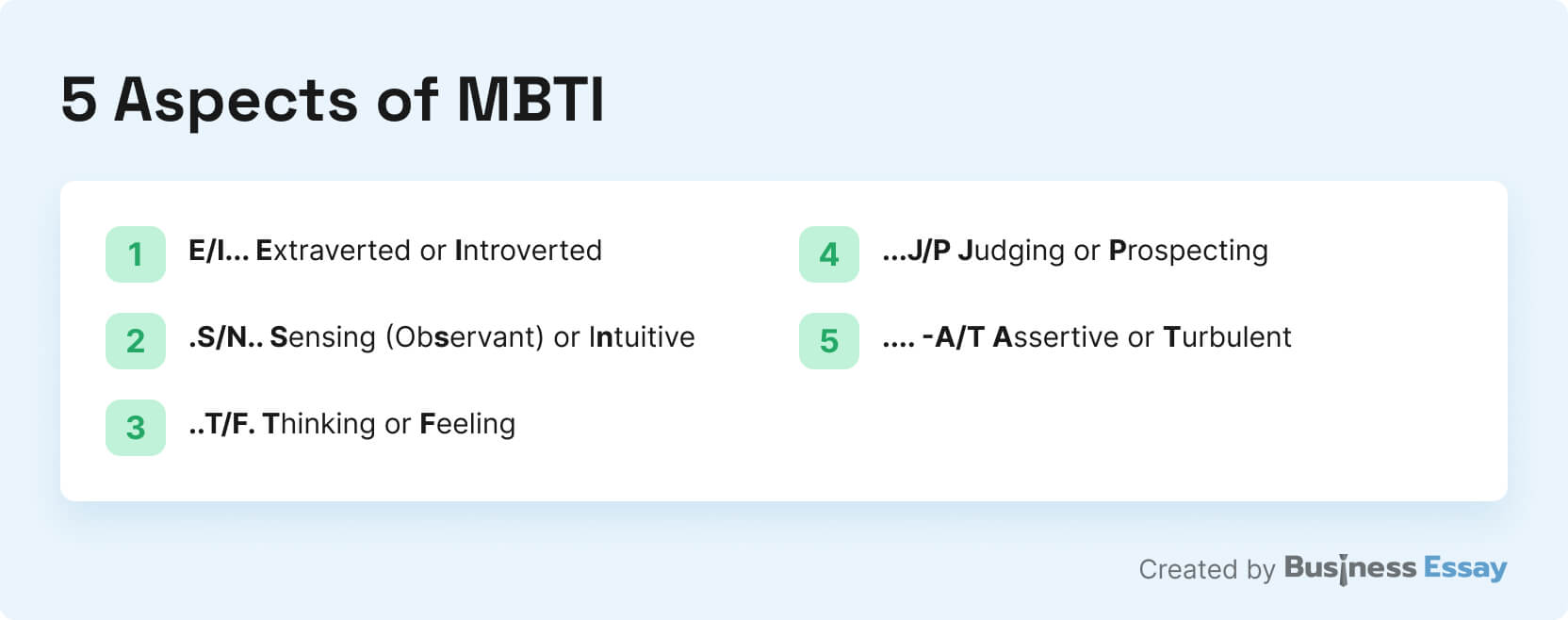
A person will naturally fall to one end of the spectrum or the other based on their responses. The combination of these preferences results in a four-letter MBTI type (INTP, ESFJ, etc.) with –A or –T in the end. These additions show whether the given person is confident or not.
While the Myers-Briggs type indicator is often referred to as a “test,” it isn’t necessarily accurate. Each category has its strengths and weaknesses. Therefore, it’s not a test as you can’t give wrong or correct answers. We should consider it assessment instead.
From now on, we will be referring to it as the Myers-Briggs Personality Type Indicator (MBTI). And if you’re striving to write a paper on the topic, check our database of essays. There, you’ll see successful academic pieces that will be perfect examples for your work.
MBTI History
In the 1920s, Carl Jung introduced the idea of psychological types into the broader debate. This would inspire Isabel Briggs Myers and her mother, Katharine Cook Briggs, to start their research. In the 1940s, their work would become known as The Briggs Myers Type Indicator Handbook. Today, we refer to it as the Myers-Briggs Type Indicator, or MBTI for short.
Myers and Briggs began their research when Katharine met her daughter’s future husband. They noticed that his way of viewing the world differed significantly from theirs. This prompted the two women to look into the literature on the topic. They investigated what was known about personalities and temperaments.
Soon, Myers and Briggs realized how similar their theories were to Jung’s. They began to imagine how they could have real-life applications.
First Experiments
The first experiments occurred in the 1940s. The mother and daughter duo asked their friends and family to participate in the studies. Their methodology involved:
- creating a question for their “test,”
- assessing the data to determine whether it was accurate,
- adding the data to the indicator if the duo found it consistent and valid.

Distribution
MBTI began to gain traction after being introduced at the Educational Testing Services in Princeton. Meanwhile, Myers wrote a booklet about the indicator, which is still widely popular. By the time she died in 1980, MBTI had gained significant attention. It was actively used by career and executive consultants, educators, and countless others.
Nowadays, the instrument continues to be an important tool in psychology. Millions implement it worldwide.
What’s the MBTI Purpose?
The tool’s objective was to make Jung’s theory practical and accessible to the broader public. According to Myers and Briggs, apparently random differences in people’s behavior are consistent with their personal perceptions and judgment. Therefore, they can meaningfully quantify these differences. Assessed and measured, the results can help people discover their basic preferences.
Thus, we can infer that:
- MBTI was always meant to be available for individuals and groups alike. It was created so that regular people could draw insights from the theory.
- Myers and Briggs wanted to highlight the importance of natural variations in people’s personalities and behavior. They believed that anyone could make better-informed choices by understanding their mindsets, worldviews, needs, and values.
✨ How Knowing Your Personality Type Can Help You

The reason for such popularity is the positive framework that helps with self-awareness and improvement. MBTI assists individuals in understanding their personalities better. Besides, passing the assessment can sometimes be required during the job search. Or it can be a part of the hiring process (especially in the US).
However, MBTI can also help you to:
- Identify your strong and weak sides. Knowing their strengths and weaknesses can allow students to recognize their potential. Based on the results, a person can see whether they have the critical thinking, organization skills, or ambitions. With the knowledge of their firm and weak sides, students can tackle almost any task.
- Increase your self-esteem. The assessment reveals character traits a person may not know about. By leaning on this information, you can maximize your strengths, which will help you become confident. Moreover, MBTI describes weaknesses not as harmful but as individual differences considered normal.
- Consider the direction of your future career. The process of career development can be more manageable. Based on the determined personality type, students can choose the profession they can excel at. For instance, the ISTP personality is usually spontaneous, creative, and excellent at problem-solving. Some jobs that fit this personality type include construction worker, police officer, or engineer.
- Realize your study preferences, learning and work environment. MBTI can help students understand how they perceive and judge information. It identifies dominant features of every personality type, which determine their learning preferences. For instance, if you are an introvert, look for a quiet place to do homework. Contrarily, extraverts will benefit from teamwork.
- Make friends and interact with others better. Each of the 16 personalities has a different approach to communication. It doesn’t mean that people only share information in one way. Yet, everyone has their preferred style of interaction. This knowledge alone can help people appreciate differences and avoid conflicts.
🎓 Every Personality Type & College Success
As we have already mentioned, each personality type is identified by five letters:
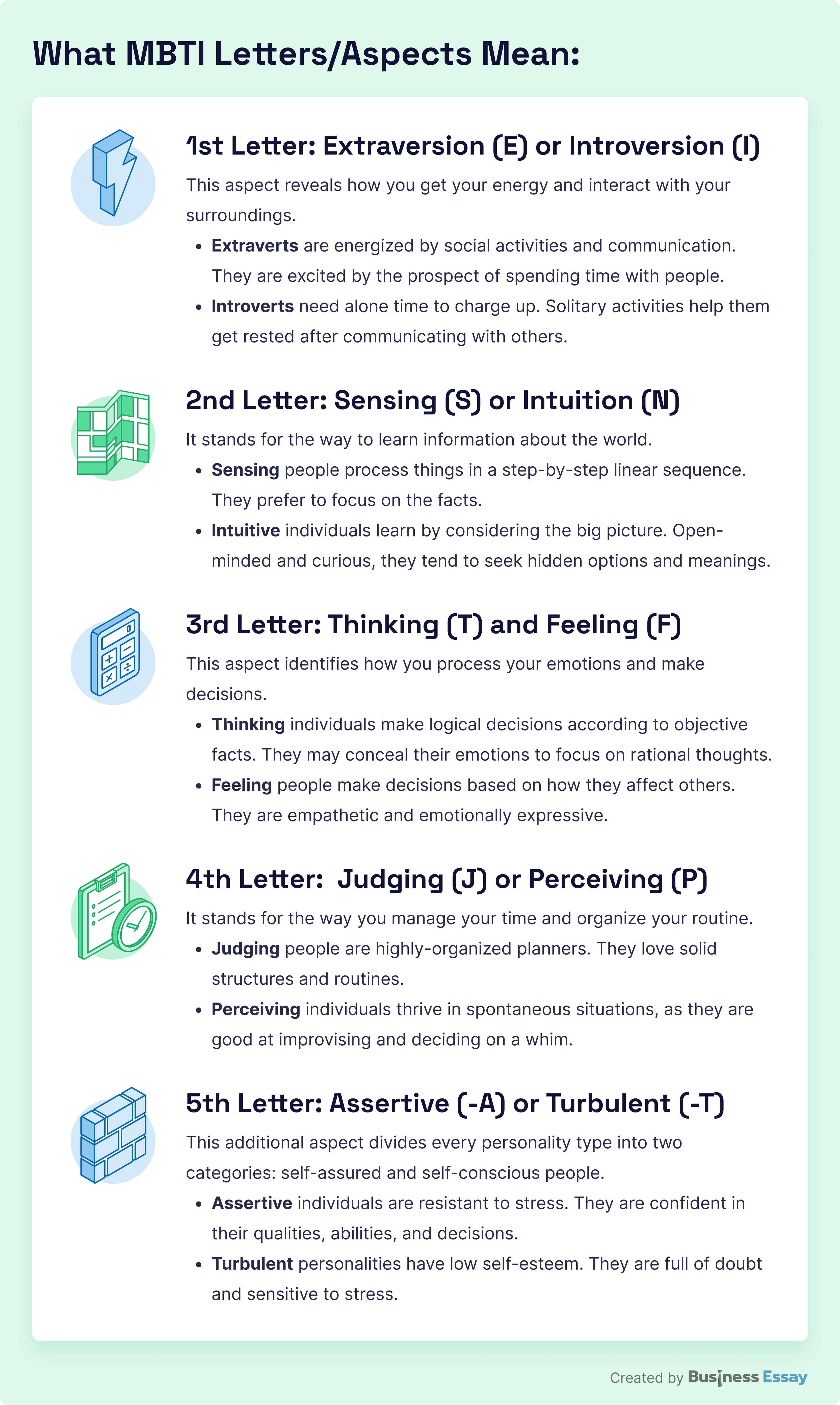
In the following sections, discover what types exist. See the strengths and weaknesses of every personality type. Additionally, we have listed what career paths and college majors may be a good match.
Keep in mind:
We won’t talk about –A and –T categories as they don’t contribute to creating a separate type. However, we recommend you check what your confidence level is nonetheless. Low self-esteem can lead to anything from communication issues to imposter syndrome. Naturally, it can affect how your personality type reveals itself.
MBTI Type: Analysts
People under the Analyst personality type are concerned with logic and rationality, often finding themselves lost in intellectual pursuits. These individuals are deep thinkers and have an open mind regarding unfamiliar concepts. After all, Analysts are driven by ideas, curiosity, and creativity. They can find a unique approach to any situation if they only set their mind to it.
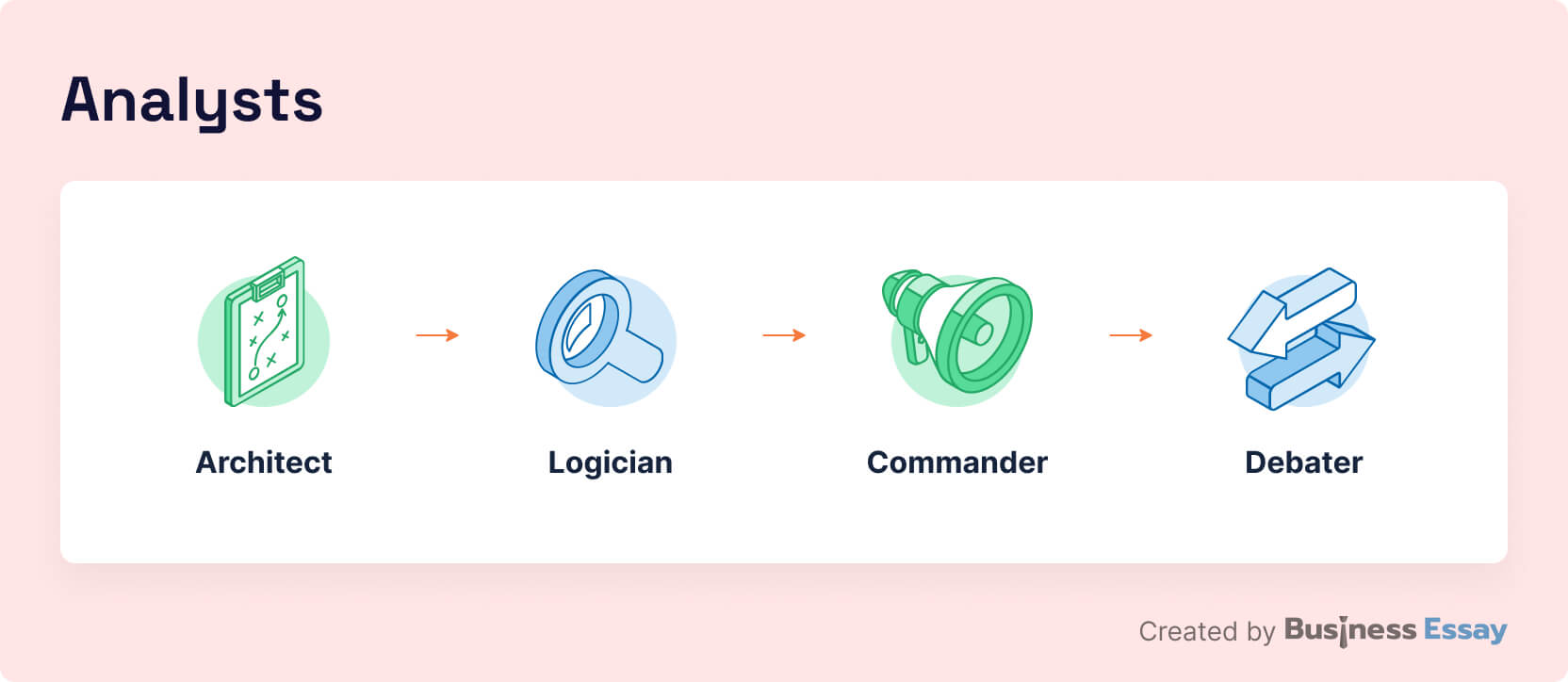
Analysts are known to hold themselves and those around them to a very high standard. They make sure to question everything being said and are very independent. However, as a result, they may struggle with social situations. That is not to say that Analysts are naturally antisocial. Instead, they are selective when it comes to choosing their friends.
These individuals prefer to engage in intellectually stimulating areas, such as scientific or technological fields.
Architect (INTJ)
Architects are known for using their intellect and logic to come up with creative solutions to their problems and difficulties. Generally, they are confident in their abilities. Yet, their self-assurance may sometimes come across as arrogance.
INTJs are known perfectionists. They will keep working hard to ensure their assignments are of the highest standard. However, they are also caring individuals that go out of their way to help and support others.
Careers & Majors
Architects are great in fields that require them to use their brains. In addition, they are better off working on their own than in a team.
- Some of the potential majors include Computer science, Finance, or Engineering.
- INTJs will excel at the following career paths: programmer, lawyer, or financial advisor.
- They should also think twice before entering these careers: sales agent, caregiver, marketing specialist.
Logician (INTP)
People belonging to the INTP type love dabbling in theories and abstraction. They are far more interested in concepts and ideas than social interaction. Besides, they can spend hours focused on a particular project or problem.
Logicians are always the ones to come up with unconventional approaches to different situations. They may be quiet individuals, but they are very creative and highly adaptable.
Careers & Majors
INTPs excel in areas that allow them to solve problems creatively. They should never go for boring, repetitive jobs.
- The most interesting majors for INTPs are Economics, Philosophy, and Physics.
- The careers that Logicians should think about are scientist, researcher, or freelancer.
- INTPs should probably avoid jobs related to manual labor, service industry, and construction.
Commander (ENTJ)
As their title would suggest, Commanders are natural-born leaders. They are capable of quickly seeing flaws in plans and procedures and can fix them with ease and efficiency. These types are also known to be honest, trustworthy people.
ENTJs are big fans of planning, organizing, and goal-setting. They are likely to keep a daily planner at hand.
These individuals are usually well-informed about current events and are well-read in general. Also, they love to keep learning new things and sharing their newly discovered knowledge.
Careers & Majors
Commanders should strive to find a career path that would let them enact their natural leadership skills. They’re also incredibly great at working in teams.
- Some suitable majors for Commanders involve Sociology, Business, and Law.
- They will feel at home if they choose to work in HR management, judicial practice, and entrepreneurship.
- ENTJs will not find satisfaction in becoming a primary school teacher, artist, or administrator.
Debater (ENTP)
The most striking quality of ENTPs is their ability to go against the status quo. This personality type is not afraid to disagree with popular opinion, enjoying a friendly debate every now and again. After all, they are known as Debaters for a reason.
These individuals are rebels by nature and like to question established rules and authority. This is because ENTPs have an active mind that is constantly seeking new challenges.
Debaters love playing the devil’s advocate. For them, it’s fun to see the other side of the argument and prolong the conversation further.
Careers & Majors
ENTPs should look for majors and jobs that will allow them to benefit from their sociable personalities. Debaters will succeed in careers that require prolonged discussions.
- The best majors for Debaters are Public relations, Politics, and Criminal justice.
- ENTPs will benefit from becoming lawyers, directors, or politicians.
- They will struggle to work as a secretary, personal assistant, or technician.
MBTI Type: Diplomats
Diplomats are some of the most empathetic and considerate personality types. These individuals care deeply about helping and connecting with other people. They are non-confrontational and would much rather cooperate than argue about pointless matters. Kindness and generosity come naturally to these people.
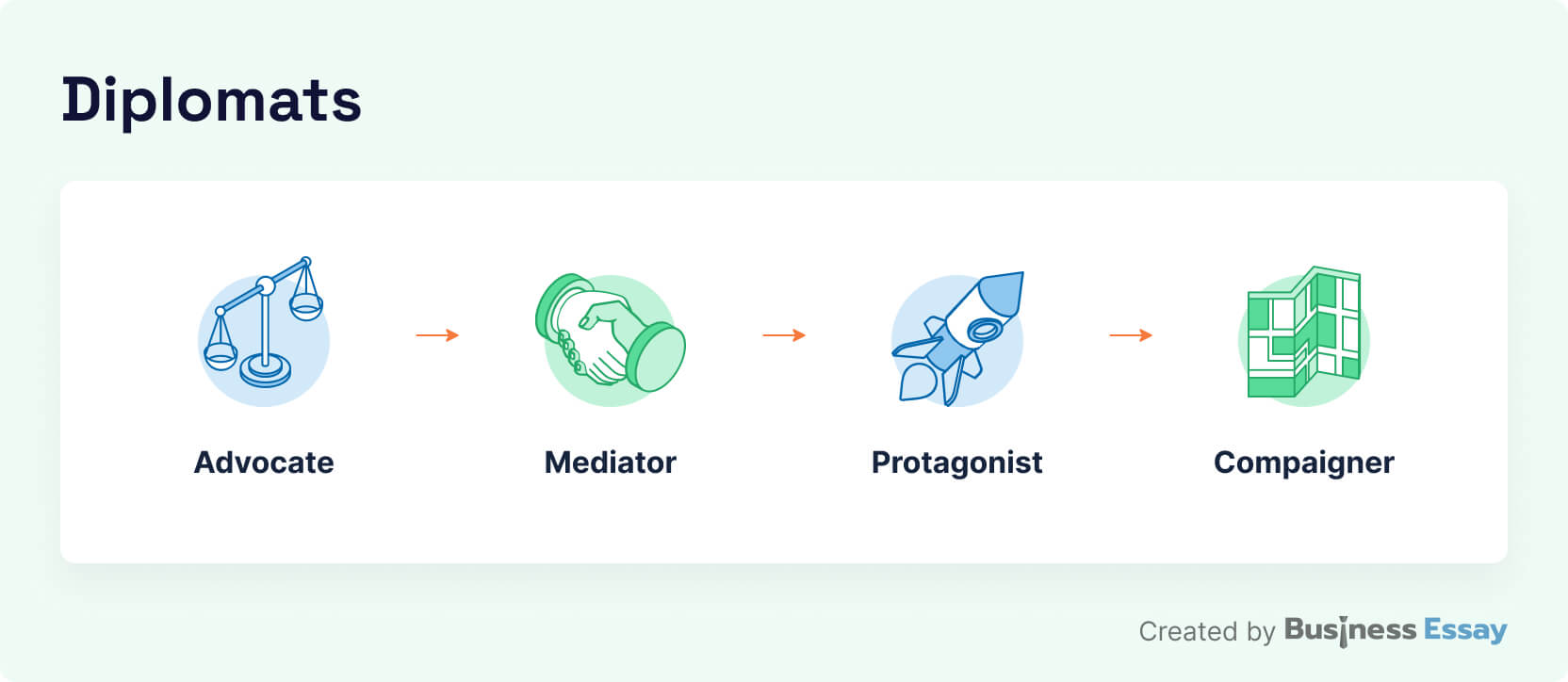
Diplomats try their best to understand and support others, which also makes them highly delicate. These people have a heightened sense of justice and are motivated by their principles. As a result, they are very sensitive to wrongdoings.
This personality type consists of creative people who see beauty in the day-to-day routine. Diplomats believe that their life’s purpose is to promote progress and social transformation. They have an intuitive sense of morality and strive to change the world for the better.
Advocate (INFJ)
Always striving to make a difference, Advocates are idealists by nature. For them, emotional fulfillment comes from assisting others and bringing about change for the better.
Since this personality type is so rare, Advocates might feel like they don’t fit in among others. This is why they can feel misunderstood and a little bit lonely.
Despite their qualities, INFJs are not just idle dreamers. These individuals are ambitious and diligent; they make sure to actualize their plans.
Careers & Majors
INFJs strive to bring about change and help as many people as possible. This is why they will feel right at home in altruistic fields.
- Advocates’ ideal majors would be Psychology, Nursing, and Fine art.
- INFJs should consider the following career paths: Therapy, Nonprofit work, or Social worker.
- They will not find the following jobs easy: Police work, Military, and Finance.
Mediator (INFP)
Mediators are exceptionally creative dreamers with vivid inner lives. They are fantastic storytellers who enjoy fine arts, music, and nature. This personality type has naturally high empathy levels, always striving to make genuine connections with other people.
Their desire to explore the depths of the human experience can make them highly introspective. That is why INFPs love connecting with people on a deeper level. They prefer talking about the meaning and purpose of life instead of ordinary matters.
Careers & Majors
Mediators look for emotional fulfillment from a job. Their greatest working environment is one that fits their interests and lacks stressful situations.
- Mediators should major in Arts, Philosophy, or History.
- INFPs will thrive in becoming writers, counselors, and librarians.
- These individuals should avoid working as managers, software engineers, or scientists.
Protagonist (ENFJ)
Constantly searching for their life’s greater purpose, ENFJs are visionaries. Known to be passionate and charismatic, this type never shies away from doing the right thing.
Protagonists are eager to aid their friends and family in their personal growth. However, their inability to stay out of other people’s problems might backfire, as not everyone will appreciate their help.
ENFJs are great at revealing people’s inner thoughts and motivations. In turn, it makes them excellent communicators.
Careers & Majors
As this type is 100% ready to help others, they should concentrate on finding an appropriate career path. With their upbeat attitude, Protagonists will continue assisting and uplifting people wherever they go.
- The most suitable majors for ENFJs are Public policy, Social work, and Education.
- They should consider one of the following work fields: healthcare professional, educator, and therapist.
- Protagonists are not suited to become programmers, manual laborers, or accountants.
Campaigner (ENFP)
There is nothing more important for Campaigners than making meaningful connections with other people. Imaginative and creative, they manage to infect everyone around them with their passion and enthusiasm. Oftentimes, they are the life of the party.
This type is exceptionally outgoing and flexible, and they love to have a good time. Yet, ENFPs are not shallow. They genuinely care about their social relationships. Behind their lively, animated façade, they are constantly introspecting.
Careers & Majors
For ENFPs, choosing the right career path may seem like an impossible task. Usually, they have a broad range of interests. The truth is that these individuals will be able to excel at nearly anything they try.
- These personalities should think about majoring in Theater, Business, or Liberal arts.
- Campaigners will be most interested in careers in filmography, HR management, or entrepreneurship.
- ENFPs will not find fulfillment in engineering, police work, or system analysis.
MBTI Type: Sentinels
Sentinels can be described as grounded, practical, and confident people. This role includes four personality types – Logisticians (ISTJ), Defenders (ISFJ), Executives (ESTJ), and Consuls (ESFJ).
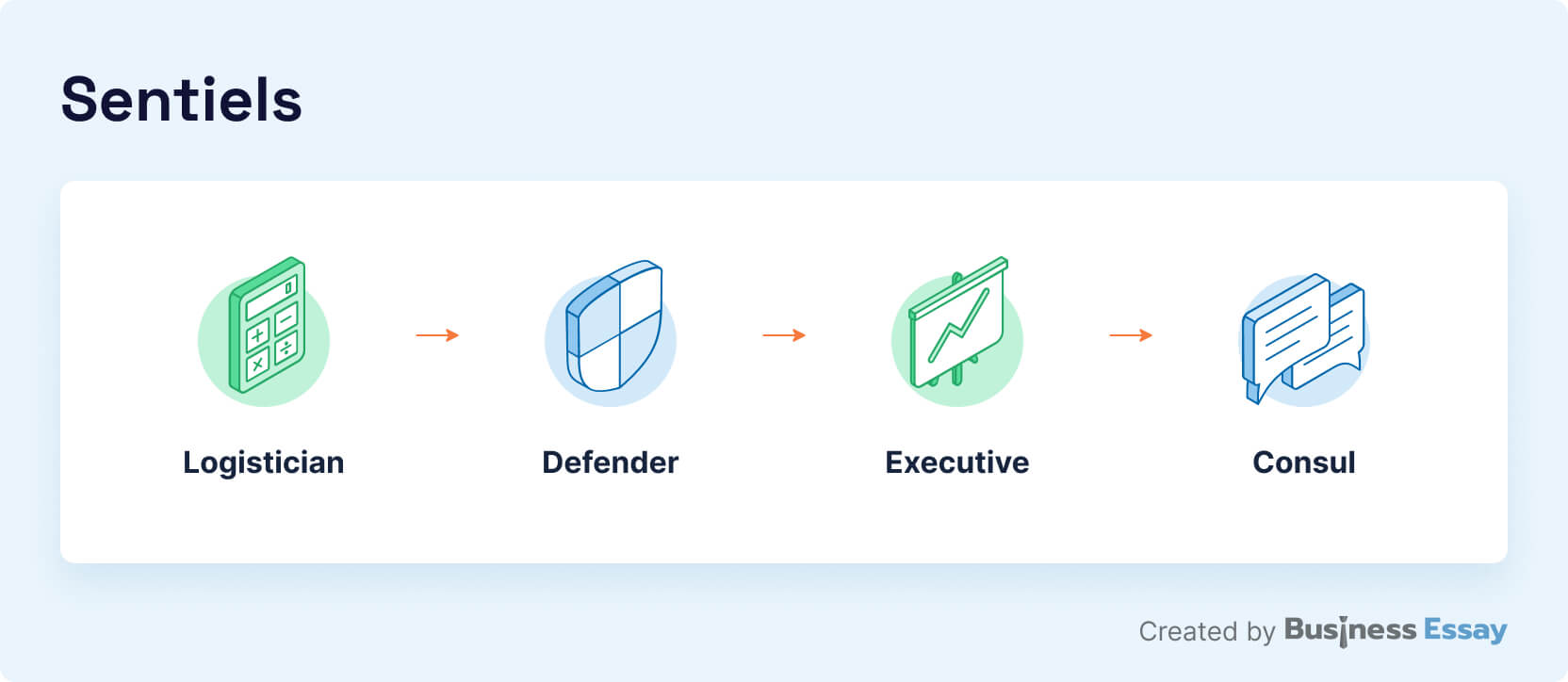
All four of these types seek order, security, and stability. For that, they are ready to put some hard work in.
Another vital detail is that Sentinel personalities are self-motivated and don’t need an external push to focus. They excel in administrative fields as they stick to plans and can handle challenging tasks.
Logistician (ISTJ)
A Logistician has Introverted, Observant, Thinking, and Judging traits. These people are rational and practical and known for their systematic approach to life. Additionally, they handle stress well and stay grounded and calm under pressure.
Logisticians know how to own their mistakes. They also strive to keep promises and are not afraid of responsibilities.
Interestingly, ISTJs make up the majority of the population. Logisticians are not the attention-seeking type; rather, they enjoy serving others and society.
Career & Majors
People with this personality type are very analytical and practical. They are also comfortable working alone.
- The best majors for the ISTJ include Computer Science, Accounting, and Business Administration.
- Some perfect jobs are dentist, accountant, software developer, and cost estimator.
- ISTJs are better to avoid becoming craft artists, actors, journalists, or photographers.
Defender (ISFJ)
ISFJ is a personality type with Introverted, Observant, Feeling, and Judging personality traits. They are very caring and responsible individuals that you can count on. One of their most distinctive traits is loyalty. ISFJs are loyal not only to their friends but also to their communities and employers.
Defenders are very humble, so they rarely require recognition for all they do for others. They find joy in helping others and have a capable, can-do personality.
Career & Majors
These individuals love working in a practical and organized environment.
- The relevant majors that ISTJ can examine are Urban Planning, Criminology, and Finance.
- The best career paths include nurse, librarian, personal assistant, HR manager, and customer service representative.
- The jobs they should consider avoiding are tour guides, politicians, sales reps, executives, and attorneys.
Executive (ESTJ)
ESTJs are people with Extroverted, Observant, Thinking, and Judging personality traits. They take pride in bringing people together and often serve as community leaders.
Executives are dedicated, honest, and reject any form of laziness in work. You can trust their promises because they set very high standards for themselves.
Career & Majors
ESTJs are very dedicated, organized, and practical. As much as they thrive in supervisory roles, unstructured and unstable learning and work environment don’t fit this type well.
- Some majors they will succeed in are Political Science, Music Management, and Industrial Technology.
- ESTJs will benefit from becoming hotel managers, stockbrokers, financial officers, and CEO/Managing directors.
- Some careers to avoid include writer, artist, musician, and social worker.
Consul (ESFJ)
A Consul is someone with an Extraverted, Observant, Feeling, and Judging personality. They have excellent manners and are hospitable. What’s more, they tend to hold their families and communities together.
Consuls are keen on making others feel special and welcomed. As a result, they feel bad when someone doesn’t appreciate or notice their efforts.
Career & Majors
ESFJs are very caring, making them excellent in medical care and social work. They should choose a major that can help them develop and rely on their practical skills.
- Some majors to choose from are Nursing, Marketing, Physical Therapy, and Hospitality Management.
- The greatest career paths for ESFJs are elementary school tutors, special education teachers, police officers, and social workers.
- Some jobs should be avoided, such as farmer, airline pilot, and power plant operator.
MBTI Type: Explorers
This is the most spontaneous category of people. Virtuosos (ISTP), Adventurers (ISFP), Entrepreneurs (ESTP), and Entertainers (ESFP) have quick reactions and quickly adapt to the moment.
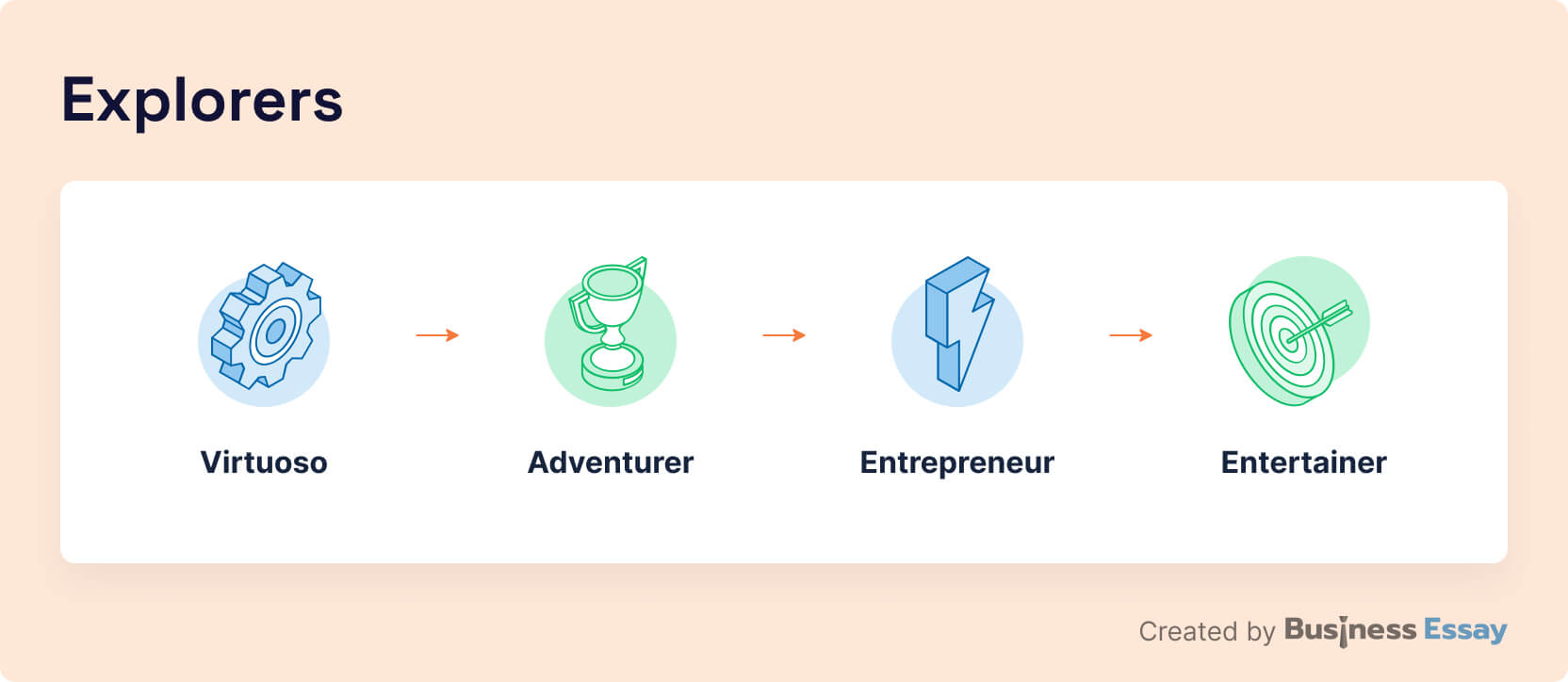
Explorers’ love for change applies to both their external and internal lives. They alter their minds easily because they dislike monotony. Sometimes it leads to them not following through with their promises and plans as they have moved on to something fresh.
Explorers love being free of obligations in their work and relationships. That’s why, according to Myers and Briggs’ findings, this type tends to avoid commitment.
Virtuoso (ISTP)
A Virtuoso has Introverted, Observant, Thinking, and Prospecting personality traits. Usually, they have a very individualistic mindset and do not need much external connection.
Virtuosos love creating and exploring the world around them with their hands and eyes. This type is uncommon as it makes up only 5% of the population. Interestingly, it is even rarer among women.
Career & Majors
A combination of natural curiosity and love for working with hands makes ISTPs’ career paths very broad and exciting.
- The majors that ISTPs should consider are Athletic Training, Business Administration, Art, Biology, and Design.
- Their perfect career options include becoming a brewmaster, airplane pilot, mechanical engineer, graphic designer, and many more.
- They should avoid becoming journalists, actors, writers, and entrepreneurs.
Adventurer (ISFP)
An Adventurer is a person with Introverted, Observant, Feeling, and Prospecting traits. This personality type belongs to people that can be described as true artists.
Everything in their life is an opportunity for self-expression. Every detail becomes important to their nature, from how they spend their free time to the profession they choose and what they wear.
ISFPs are open-minded and tolerant individuals. They are also open to changing their minds and opinions. In relationships with others, they are warm, friendly, and caring. However, since it’s an introverted type, they need time for themselves.
Career & Majors
Adventurers rarely enjoy the corporate world. So, the best career paths for them are the ones that give them a great deal of autonomy.
- Some suggested majors include Fine Arts, Journalism, Biology, Media Studies, and Architecture.
- Possible careers for the ISFPs are fashion designer, cosmetologist, botanist, chef, and interior designer.
- The jobs they should avoid are executives, marketing managers, school administrators, and salespeople.
Entrepreneur (ESTP)
An Entrepreneur is someone with Extroverted, Observant, Thinking, and Prospecting personality traits. These individuals are usually energetic, intelligent, and attention-loving.
School and other organized institutions are challenging for Entrepreneurs. This type values hands-on experience more than formal education.
Career & Majors
One of the best skills ESTPs have is their ability to learn new ways of problem-solving.
- Majors they should consider are Business Administration, Engineering, and Construction Management.
- Careers they can succeed in are sales managers, police officers, construction managers, and business analysts.
- This type should avoid becoming animators, artists, writers, psychologists, and teachers.
Entertainer (ESFP)
An Entertainer is a person with Extroverted, Observant, Feeling, and Prospecting personality traits. These individuals love enjoying life and new things and experiences.
ESFPs are very energetic, and they adore being in the spotlight. It is not a surprise that many famous people are actors. Boring life, repetitive tasks, and complex analysis are not for them. They would instead take a chance than live a life sticking to any plan.
Career & Majors
As someone highly creative, ESFPs usually enjoy having hands-on professions.
- For majors, they should look into Nursing, Pre-health Track, and Education.
- Careers to consider include pediatricians, nurses, social workers, and teachers. In addition, they can thrive in such fields as music, fashion, and photography.
- Entertainers are better to avoid careers in accounting, data mining, chemical engineering, and writing.
📌 Final Words
MBTI assessment does not give 100% definite answers about your personality, life goals, and career paths. It only offers options for future development and helps see how different people can be due to their nature.
- If you have complicated relationships with a teacher, it may not be your fault or responsibility. Sometimes, it stems from communication issues that don’t depend on anyone’s actions. You are just too different!
- If you dislike your learning environment, you might need to change it rather than try to adjust. You may need other surroundings and schedules to thrive and succeed simply due to your character.
- If you have difficulty making friends among your classmates, you shouldn’t change yourself to fit in. You might need to look for college majors or activities that will help you meet people who share your values and interests.
- And so on!
So, even if your personality type doesn’t fit you well or you don’t like the proposed career paths, it’s okay. What’s more important is that you received motivation for further development.
Thank you for reading our article. If you enjoyed the MBTI topic, check our sources below. There is plenty of information regarding relationships with others and your personal qualities. You can also send this article to friends who might be interested in the assessment.
🔗 References
- Personality Types: Articles | 16Personalities
- MBTI Basics | The Myers & Briggs Foundation
- What Is The Myers-Briggs Personality Test? | Reese Lopez, Affordable Colleges
- Myers Briggs Personality Test: Careers and Majors | Ball State University
- The Benefit to Understanding Myers-Briggs Personality Types | Bailey Thompson, The Western Howl
- Myers-Briggs Type Indicator: an Overview | ScienceDirect Topics
- Type Resources | Susan Storm, Psychology Junkie
- Myers-Briggs Type Indicator: The 16 Personality Types | Kendra Cherry, VeryWell Mind
- Chapter 3, Part 3: Jung’s Personality Types | PSY321 Course Text, Theories of Personality
- Carl Jung Personality Theory | Praveen Shrestha, Psychestudy
- The Effects of Cognitive Style on the Learning Preferences of Graduate School Students | Carey F. Tucker, John W. Underwood, Defense Technical Information Center